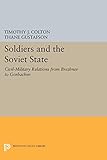Soldiers and the Soviet State : Civil-Military Relations from Brezhnev to Gorbachev / ed. by Thane Gustafson, Timothy J. Colton.
Material type: TextSeries: Princeton Legacy Library ; 1125Publisher: Princeton, NJ : Princeton University Press, [2014]Copyright date: ©1990Edition: Course BookDescription: 1 online resource (386 p.)Content type:
TextSeries: Princeton Legacy Library ; 1125Publisher: Princeton, NJ : Princeton University Press, [2014]Copyright date: ©1990Edition: Course BookDescription: 1 online resource (386 p.)Content type: - 9780691608259
- 9781400861422
- 322.50947
- DK274.3
- online - DeGruyter
- Issued also in print.
| Item type | Current library | Call number | URL | Status | Notes | Barcode | |
|---|---|---|---|---|---|---|---|
 eBook
eBook
|
Biblioteca "Angelicum" Pont. Univ. S.Tommaso d'Aquino Nuvola online | online - DeGruyter (Browse shelf(Opens below)) | Online access | Not for loan (Accesso limitato) | Accesso per gli utenti autorizzati / Access for authorized users | (dgr)9781400861422 |
Frontmatter -- Contents -- Tables and Figures -- Acknowledgments -- One. Perspectives on Civil-Military Relations in the Soviet Union -- Two. Political Change and Civil-Military Relations -- Three. The KGB and Civil-Military Relations -- Four. Resource Stringency and Civil-Military Resource Allocation -- Five. The Defense Industry and Civil-Military Relations -- Six. The Response to Technological Challenge -- Seven. Social Change and Civil-Military Relations -- Eight. The Military Abroad: Internal Consequences of External Expansion -- Nine. Conclusions: Toward a Crisis in Civil-Military Relations? -- Index
restricted access online access with authorization star
http://purl.org/coar/access_right/c_16ec
How much power does the Soviet military exert on the politics of the Kremlin? This is one of the most controversial questions in the study of the Soviet Union, here addressed by eight top Western specialists on Soviet politics and security policy. While the authors assert that the civil-military relationship has been less turbulent than often believed, they also point out that Gorbachev's reforms threaten the system of buffers that have until now shielded the military-industrial world from disruption and change.Introduced by Timothy Colton's essay, "Perspectives on Civil-Military Relations," the volume discusses civil-military relations in relation to political change (Bruce Parrott), the KGB (Amy Knight), resource stringency and civil-military resource allocation (Robert Campbell), the defense industry (Julian Cooper), response to technological challenge (Thane Gustafson), social change (Ellen Jones), and consequences of external expansion (Bruce D. Porter). Gustafson has written a concluding chapter, "Toward a Crisis in Civil-Military Relations?"Originally published in 1990.The Princeton Legacy Library uses the latest print-on-demand technology to again make available previously out-of-print books from the distinguished backlist of Princeton University Press. These editions preserve the original texts of these important books while presenting them in durable paperback and hardcover editions. The goal of the Princeton Legacy Library is to vastly increase access to the rich scholarly heritage found in the thousands of books published by Princeton University Press since its founding in 1905.
Issued also in print.
Mode of access: Internet via World Wide Web.
In English.
Description based on online resource; title from PDF title page (publisher's Web site, viewed 30. Aug 2021)


